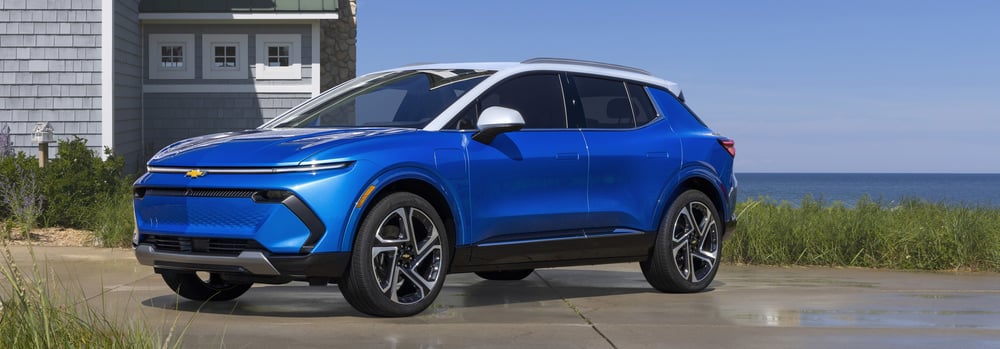Car Corner
The electric car market is evolving rapidly, which offers a mix of excitement and frustration for both enthusiasts...
As spring 2024 unfolds, we have some good news: more vehicle models are now eligible for the federal tax credit than when the list changed on January 1. The U.S. Department of Energy recently released a new list of EVs that receive between $3,750 and $7,500 in federal tax credit. And with the updates in the IRS guidelines for 2024, this credit can now be taken at point of sale, so the savings are instantaneous at IRS-registered dealerships.
In this blog, we highlight some recent additions to the list of vehicles eligible for the federal tax credit, but you can always view the full list here. If you’re in the market for a new EV, our shopping tool is a great resource to see all vehicles currently on the market and some important information, such as range, drivetrain, charging speeds, and any eligible tax credit or rebates.
Note: Not every version of the models below will necessarily qualify. Check with the dealer to determine the eligibility of your specific car.

This currently unreleased model from Acura is actually based on the new General Motors Ultium platform. This sleek luxury SUV offers 313 miles of range in its most affordable rear-wheel drive trim level. The ZDX trim has a starting price of $64,500 and is eligible for $7,500 in tax credit.

Audi’s small SUV offers high-end quality finishes and plenty of speed. The plug-in variant of the Q5 offers 23 miles of all-electric range on top of the 390-mile gas range. The Q5 has a starting price of $58,500 and is eligible for $3,750 in tax credit.

This SUV has flown under the radar since its release, but with 314 miles of range and a spacious interior, the Cadilac LYRIQ is a great mid-size SUV if you like its unique design. With a starting MSRP of $58,590, the LYRIQ is also eligible for $7,500 in tax credit to help further lower the price.

Based on the new Ultium platform, Chevy fans have long awaited the production and sale of the new Blazer EV. The Blazer is now on dealer lots, although it can be hard to find one that hasn’t already been claimed by another buyer. The base Blazer has a range of 279 miles, but the RS RWD trim can reach up to 324 miles. The Blazer has a starting price of $48,800 and is eligible for the full $7,500 tax credit.

The Equinox is also based on the Ultium platform and is expected to cost less than the available Blazer and be available at some dealers soon. The Equinox is expected to have a range of 319 miles. Chevrolet has not yet released pricing information for Equinox, but it will be eligible for $7,500 in federal tax credit.

Honda recently announced the new Prologue and they’ve invested quite a bit into their marketing campaign with billboards along highways and plenty of social media ads. This is their third EV model, after the Clarity Plug-in Hybrid and the Fit EV, which were only briefly available in New England. While this SUV is not yet for sale, we do know that it is based on the Ultium platform from General Motors and will have a range of 296 miles for the front-wheel drivetrain trim and 273 miles for all-wheel drive. The Prologue will have a starting price of $47,400 and is eligible for $7,500.

The Nissan LEAF is one of the most affordable options on this list and could be a wonderful small hatchback for those who live in a city or don’t need to travel very far in one trip. The base LEAF has a range of 149 miles and the LEAF PLUS has an improved range of 212 miles. But the price more than makes up for the below-average range, with the LEAF starting at $28,140 and the LEAF PLUS starting at $36,190, plus both are eligible for $3,750 in tax credit.
It’s always exciting when a new EV is added to the ever-growing roster of cars eligible for federal tax credit. This development is not just good news; it's a significant step forward in making EVs more accessible and affordable to the average buyer. We expect to see this list expand in the coming months as more and more EVs are manufactured in North America and therefore meet one of the key requirements for the federal tax credit. Notably, Hyundai will soon complete construction of a new electric vehicle manufacturing plant in Georgia. This plant signifies a major commitment to the electric vehicle market and is a clear sign of the growing importance of North America as a hub for EV production.
Recognizing the fast pace at which the electric vehicle market evolves, we encourage you to subscribe to our newsletter. By doing so, you’ll ensure that you’re always up to date on the latest developments in the electric car market, including new models of EVs becoming available, updates on tax credits and incentives, and progress in local and national efforts to support sustainable transportation.
The electric car market is evolving rapidly, which offers a mix of excitement and frustration for both enthusiasts...
Pardon this first-person account, but if you are thinking about buying or leasing an electric vehicle (EV) this...
Comments